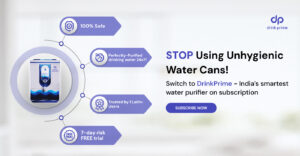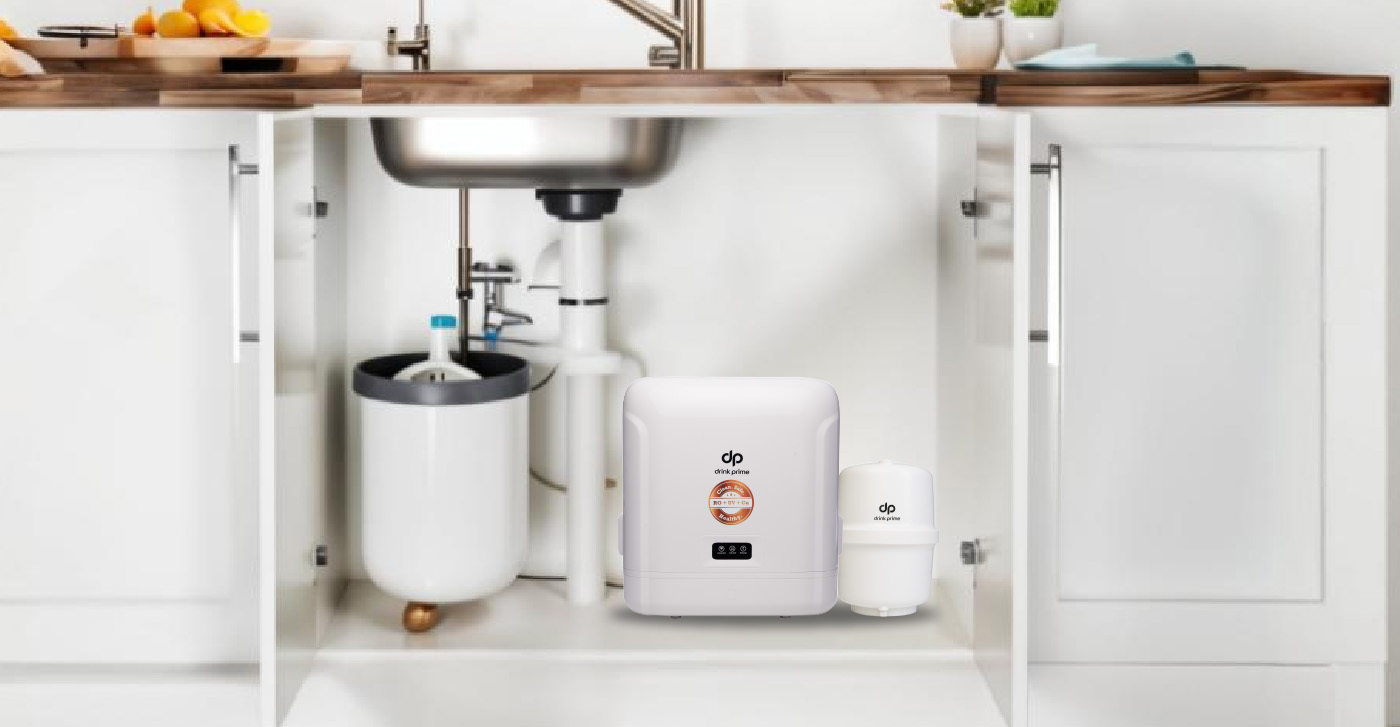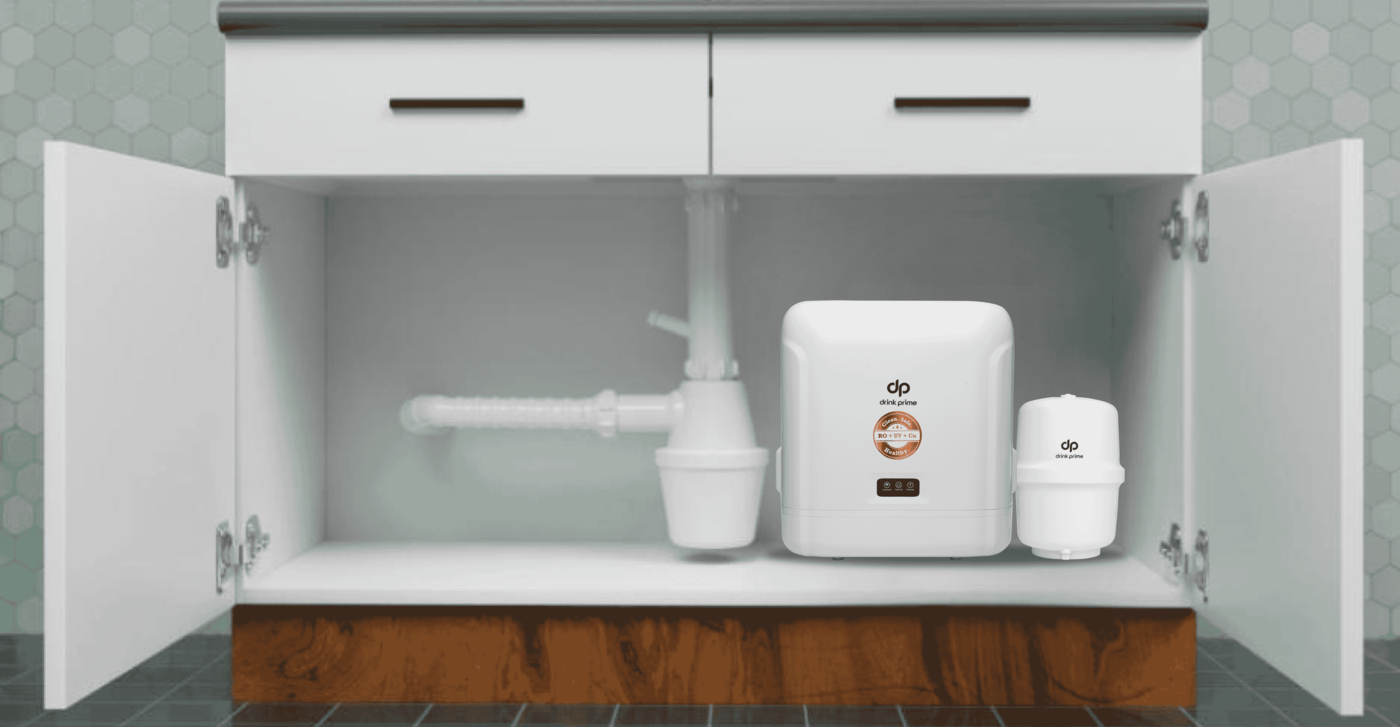Did you realise that the fast growth of cities has a substantial ecological impact? The impact on water quality is particularly alarming. As concrete jungles grow, so does the demand for our water supply. Understanding the impact of urbanisation on water quality and the repercussions is critical for sustainable city development.
In this blog, we will look at the influence of urbanisation on water quality and how it affects our access to safe drinking water. Let’s get started.
How can urbanisation impact groundwater quality?
Many cities have grown and expanded rapidly as a result of urbanisation. While this growth fosters economic opportunity and innovation, it also raises serious problems, one of which is the impact of urbanisation on water quality.
1. Decreased Groundwater Recharge
More areas are covered with concrete and asphalt as cities expand. This limits natural infiltration, resulting in decreased groundwater recharge. Lower groundwater levels could lead to a higher reliance on alternate water sources.
2. Increased Pollution
Pollution levels and urbanisation’s impact on water quality are extremely linked. Urban areas produce vast amounts of wastewater and contaminants from several sources, including:
- Heavy metals, chemicals, and organic materials can all be found in industrial wastewater.
- Urban runoff contains oil, grease, pesticides, and fertilisers.
- Septic tank leaking contaminates groundwater with germs.
These pollutants can contaminate groundwater aquifers, making them unsafe to drink.
3. Land Subsidence
Excessive groundwater extraction can destroy infrastructure and further deplete groundwater resources.
What causes city water pollution?
Safe drinking water is essential for human health and well-being. However, water poisoning in cities endangers this vital resource. Several things lead to water contamination, which affects our water quality. The following are some of the primary sources:
1. Industrial Wastewater
Industrial operations frequently release untreated or inadequately treated effluent into adjacent rivers, polluting them with various pollutants.
2. Heavy Metals
Heavy metals, including lead and mercury, could accumulate in aquatic organisms, posing significant health concerns.
3. Chemicals
Solvents and pesticides could be toxic if absorbed through drinking water.
4. Organic Matter
Untreated wastewater lowers oxygen levels and increases the growth of dangerous microbes. These pollutants may eventually become our drinking water supplies, posing health dangers and prompting costly treatment operations.
5. Urban Runoff
Stormwater runoff from streets, parking lots, and rooftops can pick up a variety of pollutants and transport them to waterways:
- Oil and grease from leaking automobiles and inappropriate disposal pollute water, endangering aquatic life.
- Pesticides and fertilisers used in landscaping and gardening can be washed away by rains, contaminating surrounding streams and rivers.
- Sediment: Sediment from building sites and unpaved areas can kill aquatic organisms while degrading water quality.
Impact of Urbanisation on Drinking Water Quality
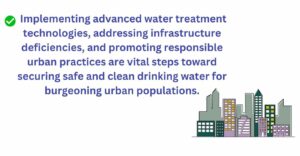
Urbanisation, or the fast transformation of rural areas into urban centres, has far-reaching consequences for drinking water quality. As cities become more congested, the burden on water supplies increases, resulting in a series of difficulties that directly affect the safety and cleanliness of our water.
1. Increased Demand and Depletion of Water Source
High Water Demand
Urbanisation increases the demand for drinking water because of the concentration of people in cities. This growing demand greatly strains local water supplies, frequently exceeding their sustainable capacity.
Exploiting Distant Sources
In response to rising demand, cities may use water sources further away. This has an increased environmental impact because carrying water over large distances demands a lot of energy.
2. Pollutants Due to Urban Activities
Industrial Runoff
Many metropolitan companies release pollutants into bodies of water. Industrial runoff introduces harmful chemicals and heavy metals into water sources, endangering drinking water safety.
Stormwater Pollution
Cities’ impermeable surfaces, such as highways and pavements, impede natural water flow. This transfers pollutants from roads and public spaces into waterways and increases stormwater runoff.
3. Concerns Around Ageing Infrastructure and Water Treatment Systems
Old Pipes and Infrastructure
As rusted pipelines deteriorate, water quality suffers, and possible contaminants enter the supply.
Overwhelmed Water Treatment Facilities
Rapid urbanisation exceeds the capacity of water treatment plants. Overwhelmed by the enormous volume of water to be treated, these facilities may need help maintaining strict purification requirements, increasing the chance of toxins reaching consumers.
4. Public Health Risks and Quality Concerns
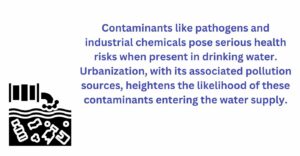
Pathogens and Chemicals
Drinking water contaminants, such as bacteria and industrial pollutants, can offer serious health risks. With its associated pollution sources, urbanisation increases the likelihood that these chemicals will enter the water supply.
Need for Stringent Monitoring
The impact of urbanisation on water quality necessitates important standards. Ensuring drinking water quality in cities requires close monitoring and strong regulatory frameworks. Rapid urbanisation necessitates adaptive strategies to handle emerging pollutants and growing hazards to water safety.
Get 7 Days Risk Free Trial
Conclusion
The impact of urbanisation on drinking water quality is a difficult subject requiring comprehensive solutions. Sustainable urban growth must prioritize both the amount and quality of water resources. Implementing contemporary water treatment technology, addressing infrastructure deficiencies, and fostering good urban practices are all crucial to maintaining safe and clean drinking water for rising urban populations.
FAQs
What is the problem with water in urban areas?
In urban areas, water quality is often compromised by pollution from industrial waste, sewage, and chemical runoff. Overpopulation puts pressure on existing infrastructure, leading to water contamination. This results in unsafe drinking water, posing health risks to residents if not properly treated. Protect your family from water pollution in urban areas. DrinkPrime provides a free, thorough water quality analysis, both before and after installing your purifier.
How water is wasted in urban areas?
Water is wasted in urban areas due to inefficient infrastructure, leakage in pipes, and overuse in households and industries. Additionally, poor water management practices, excessive irrigation, and lack of awareness lead to unnecessary consumption, further depleting the already strained water resources. Urban water quality is our priority. DrinkPrime provides free, thorough water analysis before and after purifier installation.
How do you maintain good quality of water?
To maintain good urban water quality, ensure proper filtration using reliable systems like RO UV purifiers, regularly clean water storage tanks, fix leaks, and avoid chemical runoff. Additionally, reduce pollution by properly disposing of waste and promoting sustainable water management practices in communities. We're committed to ensuring clean water in urban homes. That's why DrinkPrime offers free, detailed water analysis before and after purifier installation.
What are safe water sources?
Safe water sources include treated municipal water, wells with proper sanitation, and water from protected springs or rivers. Using reliable purification systems like RO UV filters ensures water is free from contaminants, making it safe for consumption. Always check for urban water quality and cleanliness before use. Clean water for urban homes is our promise. To deliver on that, DrinkPrime provides free, detailed water analysis before and after purifier installation.

